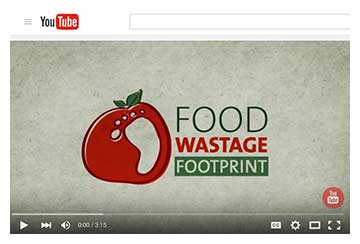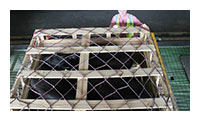 Dear GRSB Member, Dear GRSB Member,
We start Connect this week by welcoming Dennis Laycraft, as he will take over as GRSB President from the beginning of 2016; congratulations Dennis, we look forward to working with you in the year that the second Global Conference on Sustainable Beef will take place in your home province of Alberta.
Most of you will be aware of the fact that the COP21 climate summit is taking place in Paris this week and next week. We read more and more often how livestock are a leading cause of climate change. Probably because I read more about livestock than other subjects, I sometimes get the impression that the world has decided that livestock are in fact the only cause. This worries me for a number of reasons. Firstly the over emphasis on emissions from livestock seems to disregard the 85% of emissions are not from livestock. It seems remarkable that while ruminants have co–evolved with grassland ecosystems over 50 million years, there are consumers who feel that continuing (over) consumption of fossil fuels is acceptable, but that ruminant livestock no longer are. I recognise that numbers change, that habitat conversion due to livestock has certainly taken place, and that poor management has led to degradation of large percentage of those grasslands. However, I also feel that a more balanced view needs to be actively promoted – for a start the very great importance of those grassland ecosystems in providing food, in biodiversity, in the water cycle and of course as a carbon sink (the largest potential sink to capture atmospheric CO2 there is).
There are always vested interests that want to gain control of land, and by type, grasslands are the largest area of land that mankind makes use of so they represent a huge resource to those that would use them in any other way. The more acceptable it becomes to blame ruminant livestock for environmental problems (with or without justification) the easier it becomes for opposing interests to mandate changes in land use, with disastrous consequences for grasslands and all who derive their livelihoods from them.
Thanks,
Ruaraidh Petre
Global Roundtable for Sustainable Beef
Executive Director
Sustainability News
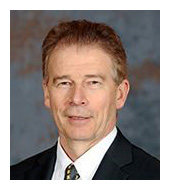 Dateline: 11/25/15, Source: Bovine Veterinarian Dateline: 11/25/15, Source: Bovine Veterinarian
Upon unanimous vote by the board of directors of the Global Roundtable for Sustainable Beef (GRSB), Dennis Laycraft, executive vice president of the Canadian Cattlemen's Association, was elected as the 2016 president of the global organization. Also voted in to GRSB leadership positions were Carlos Saviani, World Wildlife Fund, elected as vice president, and Cameron Bruett, JBS, elected as an Executive Committee member–at–large.
Laycraft, a well–known spokesman for the beef cattle industry in Canada, has extensive experience in the areas of trade, product safety and animal disease issues. He has been active on both the national and international levels, addressing issues impacting Canada's beef producers for several years.
Dateline: 11/25/15, Source: The Cattle Site
The Global Roundtable for Sustainable Beef (GRSB) recently met in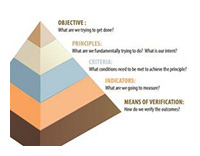 Amsterdam with 75 members from across the food chain representing 28 organisations with the key objective of working groups reporting back and sharing progress to–date. Larry Stewart, senior director, global supply chain for beef, pork and fish with McDonald's and a member of the GRSB executive committee, attended the meeting and shared his perspective of where the GRSB is headed. "The regional roundtables have really pulled together and are working to shape indicators that stem from the GRSB Principles and Criteria which were approved last November at the GRSB's meeting in São Paulo, Brazil," Mr Stewart said. "The indicators are about making sustainable beef production practices relevant for regional production systems and ecosystems." Amsterdam with 75 members from across the food chain representing 28 organisations with the key objective of working groups reporting back and sharing progress to–date. Larry Stewart, senior director, global supply chain for beef, pork and fish with McDonald's and a member of the GRSB executive committee, attended the meeting and shared his perspective of where the GRSB is headed. "The regional roundtables have really pulled together and are working to shape indicators that stem from the GRSB Principles and Criteria which were approved last November at the GRSB's meeting in São Paulo, Brazil," Mr Stewart said. "The indicators are about making sustainable beef production practices relevant for regional production systems and ecosystems."
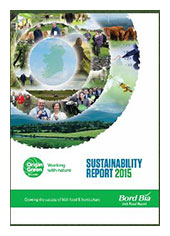 Dateline: 11/09/15, Source: By Margaret Donnelly, AgriLand Dateline: 11/09/15, Source: By Margaret Donnelly, AgriLand
Irish beef farmers have the opportunity to generate €300m in on–farm income annually, according to Bord Bia, if they increase their sustainability. Figures from the Bord Bia Sustainability Report 2015 show that, on the average suckler beef farm, increasing the calving rate from 80% to 92% would potentially reduce the carbon footprint by 10% and increase the financial performance of the farm by €2,300 a year.
Dateline: 11/09/15, Source: By Lucie Bell, ABC.net AU
A vaccine to lower greenhouse gas emissions in cattle has reached testing stage in New Zealand. Cattle burp frequently and when they do they produce methane, a gas that contributes significantly to greenhouse gas emissions from countries such as Australia and New Zealand. Strategy and investment leader for sustainability at Dairy NZ, Rick Pridmore, said the development of a vaccine could mean a reduction in methane emissions from cows by between 25 and 30 per cent.
Dateline: 11/25/15, Source: Scoop.co.nz
Taupo Beef has been named the overall winner of the 2015 NZI Sustainable Business Network Awards held at Shed 10 on Auckland's waterfront tonight (24 November).
Taupo Beef won the Restorative Impact Award as well as the 'NZI Greatest Contribution to a Sustainable New Zealand' (Supreme Award) through its vision to lead New Zealand beef farming while also protecting the water quality in Lake Taupo. The standard New Zealand farm business model of increasing production in the face of rising costs and flat commodity prices no longer applied in the Taupo area due to the Waikato Regional Council's introduction of nitrogen caps.
Dateline: 11/11/15, Source: The Cattle Site
Ruminant production has a vital role to play in global food security.However, for livestock production to be sustainable it has to meet three essential targets – a societal need, an economic need and an environmental need according to Prof Michael Lee, Head of the North Wyke Site of Rothamsted Research, and chair in Sustainable Livestock Systems at University of Bristol. Speaking at the annual conference of the UK's Agricultural and Horticultural Development Board's beef and lamb sector, Prof Lee said that sustainable production also had to meet the challenges of a growing population, increasing urbanisation and climate change. At the same time, sustainable production and sustainability in grazing practices have to meet the needs of improving the health of consumers, be beneficial to society and also make a profit for the farmer.
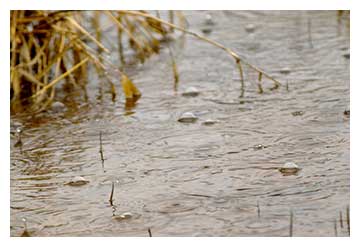 Dateline: 11/18/15, Source: By Reynold Bergen, Canadian Cattlemen Dateline: 11/18/15, Source: By Reynold Bergen, Canadian Cattlemen
This summer has seen unusual rainfall patterns, low river levels and drought in large parts of Western Canada and the Western States. Some people blame water shortages on the beef industry and are ready to answer the question, "how much water does beef production use?" Unfortunately, these answers are often wrong, highly misleading and based on, "how big a number will people possibly swallow?"
Dateline: 11/12/15, Source: By Bryan Weech, BEEF Magazine
Sustainability has become a major concern, not only in society in general but in the beef industry, where both global efforts (Global Roundtable for Sustainable Beef) and national organizations (Brazilian Roundtable for Sustainable Beef, Canadian Roundtable for Sustainable Beef, and the U.S. Roundtable for Sustainable Beef) have brought attention to the need to work on continuous improvement of the environmental, financial and social sustainability of beef production.
However, there's an aspect to food production and consumption that must be tackled if the beef industry, and society as a whole, is to continue its sustainability commitment and efforts. With as much as 40% of all food produced going to waste, it is understandable that many organizations and government initiatives have turned their attention to this key issue.
Dateline: 11/12/15, Source: By Bob Langert, Green Biz
If the current language of sustainability were abandoned, what ONE THING (one way/approach/set of principles) would you advocate to achieve this end goal?
Talking "sustainability" is not easy, is it? Recently, while sitting at a table of Wyoming cattle ranchers, set to give a speech, a rancher's 10–year–old son looked at me with all his innocence and asked: "What is sustainable beef?" — with a quixotic emphasis on "sustainable." My panicked answer, later.
Then even more recently I heard in an informal discussion with a few corporate sustainability practitioners centered on "how we need to abandon the current language of sustainability."
Dateline: 10/21/15, Source: By Laura Merrill, Andrea M. Bassi, Richard Bridle, Lasse Toft Christensen, International Institute for Sustainable Development
Subsidies for the consuption of fossil fuels were estimated at US$550 billion in 2013, according to the International Energy Agency. This report by IISD and the Nordic Council of Ministers modeled the impact of removing fossil fuel subsidies in 20 countries between 2015 and 2020. The results show that this alone would reduce national emissions, against business as usual, by an average of 11 per cent. By taking 30 per cent of subsidy savings, and investing in renewable energy and energy efficiency, national emissions are reduced further to an average of 18 per cent by 2020. Download PDF HERE.
.
Members In The News
Dateline: 11/09/15, Source: By Will Green, Supply Management
McDonald's has announced that all centrally–purchased packaging in Europe is now sustainably sourced.The fast food chain said items including cartons, cups, bags, napkins and tray liners were made with wood fibre from recycled sources or forests certified by the Forest Stewardship Council or the Programme for Endorsement of Forest Certification.The announcement applies to packaging bought centrally for 38 European countries, including the UK, but not to some locally–sourced items such as salt and pepper sachets and donut cases. The target was set in December 2011.
Dateline: 11/06/15, Source: By Joel Durkin, FG Insight
Calls were made for collaboration between the UK and New Zealand to tailor global production to market demand. Dave Harrison, regional manager for Europe at Beef and Lamb New Zealand, discussed the nature of New Zealand imports appearing on UK retail shelves. Supermarket stocking of New Zealand lamb has caused frustration in recent months, after an AHDB exercise showed facings of UK product had fallen on shelves in August, particularly in Tesco stores.
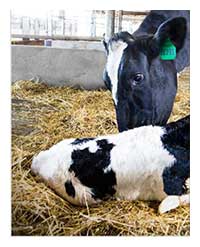 Dateline: 11/09/15, Source: By John Maday, Drovers CattleNetwork Dateline: 11/09/15, Source: By John Maday, Drovers CattleNetwork
Merck Animal Health has developed a series of apps to help beef producers and dairy operators plan and document comprehensive health protocols for their herds. The "Herd Health Manager" app currently is available for cow–calf producers, and a "Cattle Treatment Manager" app and a "Dairy Herd Health" app are in final development for release early in 2016.
Dateline: 11/26/15, Source: By Colleen Schreiber, Livestock Weekly
Dr. Todd Armstrong, senior director of U.S. beef operations for Elanco Animal Health, has made it his life's mission to stop world hunger. He shared his vision for a food–secure world and discussed agriculture's role in providing access to an affordable, healthy and stable food supply during the recent Texas and Southwestern Cattle Raisers Association policy conference here. He started his presentation with a challenge, more or less.
"I believe with all of my heart that we have talked enough," said Armstrong. "I believe with all my heart we have enough solutions to solve this growing issue of food insecurity. The question is, do we have enough courage, enough leadership to act right now?" The disease of hunger, Armstrong said, kills 25,000 individuals worldwide every day. He defined food security this way: "When you don't have to worry about where your next meal comes from."
Dateline: 11/11/15, Source: Scoop.co.nz, Rabobank News Release
Increased environmental regulation will have a significant impact on New Zealand's sheep and beef farmers as well as their dairy counterparts, according to new research by agricultural banking specialist Rabobank.
"The environmental risk profile of sheep and beef farming is different than dairy, but with sheep and beef farms representing 30 per cent of New Zealand's total land area and 71 per cent of pastoral land use, the sector is still a considerable contributor to the total contaminant load that is entering New Zealand's waterways," Rabobank Country Banking general manager Hayley Moynihan said. "It is therefore crucial that farmers in this sector plan for, and adapt to, increased environmental regulation."
Dateline: 11/16/15, Source: Reuters
Ahold and Delhaize announce future executive team of the intended combined company. Future Executive Committee will be comprised of Management Board members as announced on June 24. Ahold proposed Executive Committee after merger includes Marc Croonen as Chief Sustainability, Transformation & Communications Officer. Ahold proposed Executive Committee after merger includes Hanneke Faber as Chief E–Commerce & Innovation Officer. Ahold and Delhaize remain on track to complete their proposed merger by mid–2016..
Our Members
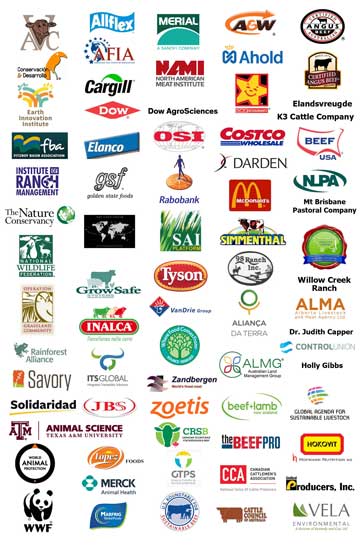
|
To read the entire source article, click on the link in the headline.
Welcome to the Table!
We Welcome The Newest Members to the Roundtable
Dateline: December 2015
Constituency: Retail
The GRSB welcomes Costco Wholesale to the Retail Constituency Group. They have been an Observing member of the Roundtable since October 2014 and have placed their membership commitment for 2016 in the Retail Group.
Constituency: Civil Society
World Animal Protection is a global animal welfare organization, active in more than 50 countries. From their offices around the world, they work with local partners, businesses and governments to help people find practical ways to improve animal welfare worldwide.
They are a member of the guiding strategic group of the FAO–led Global Agenda for Sustainable Livestock and works extensively with food industry producers and other corporates to improve farm animal welfare, including Nestle and other major multinationals.
Global News
Dateline: 11/23/15, Source: By Doug Carder, Drovers CattleNetwork
The federal Veterinary Feed Directive means "the days of no records and verbal treatment protocol are gone." Dr. Mike Apley, professor of veterinary clinical sciences at Kansas State University, delivered that message to producers and other members of the swine industry Thursday during KSU Swine Day in Manhattan.
"We have never had the legal ability to use feed drugs other than as labeled. We've never had that legal opportunity," Apley said. "So if you're using a feed antibiotic in a way that's not specifically allowed on the label, you are breaking the law. That has not been enforced, because how do you know?
"Now as we move into the Veterinary Feed Directive, a veterinarian is going to have to make an FDA accessible record of what that drug is authorized to be used for, and in follow–up the FDA may go to any site that a VFD copy is at and investigate how it was used. So the transparency is going to be greatly increased."
Dateline: 11/11/15, Source: By Alan Bjerga, Bloomberg News
The year is 2026. Flooding, worsened by climate change, has devastated Bangladesh and driven millions of hungry refugees to its border with India. Worried about unrest and disease, India asks other nations for help.
The U.S. and China respond –– China with aid deliveries, the U.S. by boosting aid to Pakistan, which has its own food crisis that's adding to India's tensions. That assistance helps India focus on Bangladesh. The crisis recedes.
While the scenario was fictional, two food–price shocks since 2008 have prompted riots and fueled revolutions around the world. Experts say such disruptions are likely to occur more frequently as a warming climate plays havoc with global food production. That fear brought together representatives of corporate food producers, aid groups and governments for two days this week in Washington where they role–played a simulated food crisis.
Dateline: Source: Food and Agriculture Organization of the United Nations
Global food production must increase by 60% by 2050 in order to meet the demands of the growing world population. Yet, more than one third of the food produced today is lost or wasted. Food loss refers to the decrease in edible food mass at the production, post–harvest and processing stages of the food chain, mostly in developing countries. Food waste refers to the discard of edible foods at the retail and consumer levels, mostly in developed countries. This food wastage represents a missed opportunity to improve food security and comes at a steep environmental price. Watch the Food Wastage Footprint I Video
Dateline: 11/15/15, Source: By Cassie Hough, ABC Rural AU
New technology in livestock industries is allowing graziers to collect and use data from their farms to improve productivity and minimise risks. For years precision agriculture has been dominated by the cropping sector, but livestock producers are increasingly turning to precision technology to drive profitability.
The University of New England's SMART farm has be set up to showcase the latest on–site technologies that aim to improve productivity, environmental sustainability and safety on Australian farms.
Dateline: 11/17/15, Source: EMA Europa.eu
The draft Committee for Medicinal Products for Veterinary Use (CVMP) strategy on antimicrobials for 2016–2020 sets clear objectives and course of action for the next five years, based on a 'One Health' approach. The CVMP's vision is the availability of effective antimicrobial medicines for the treatment of important infectious diseases of animals with, at the same time, minimum risks to animals or humans arising from their use. Download PDF HERE.
Dateline: 10/20/15, Source: By Annabelle Beale and Colin Bettles, The Land
One typically short, sharp quip from Barnaby Joyce illuminates the huge commercial opportunity accompanying the inaugural air–shipment of Australian live slaughter–cattle exports into the lucrative Chinese beef market.
This afternoon's history–making flight also delivers a fresh definition of flying cattle–class from Australia to China on a 747 jumbo jet, he said.
"The way prices are going at the moment, the cattle will be travelling above deck at the pointy end of the plane in first class and the passengers will be in the cargo section below," the Federal Agriculture and Water Resources Minister told Fairfax Media.
Dateline: 11/20/15, Source: By Michelle Perrett, GlobalMeat News
Australia and the EU are to secure a closer bilateral trade partnership as a precursor to a formal free trade agreement (FTA). Australian trade minister Andrew Robb revealed earlier this week that Australia and the EU will begin procedures to secure the partnership.
The EU is to undertake an impact assessment on the merits of an FTA with Australia. Both parties will also complete a scoping exercise to define the overall approach to potential negotiations.
Dateline: 11/16/15, Source: By Sarah Alderton, Farmers Weekly
A range of genomic breeding values (GEBVs) for carcass traits in Limousin cattle could help beef farmers add value to their stock and better meet supermarket requirements. GEBVs will help beef farmers select cattle that have the genes to supply processors with the higher value cuts.
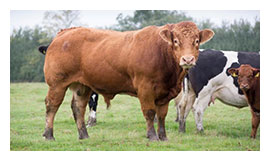
News We Can Use
If you have news to share with the Global Roundtable for Sustainable Beef membership, please send it to polly.welden@grsbeef.org
|


